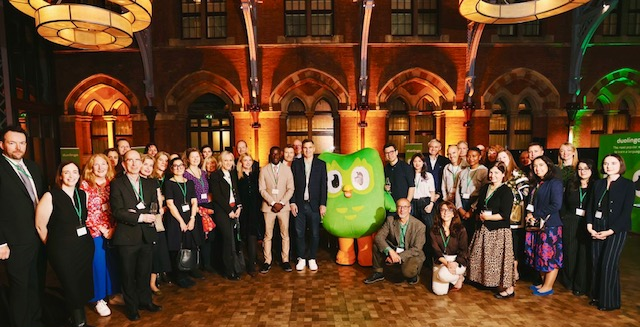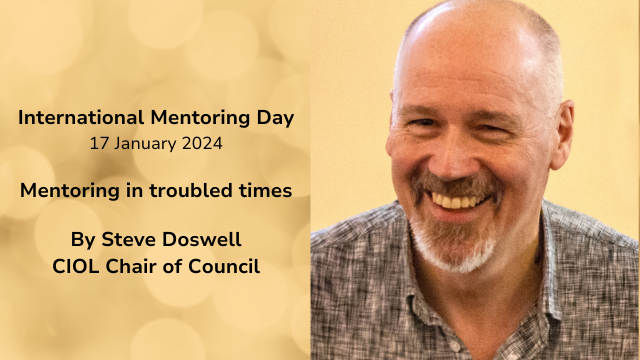-
QUALIFICATIONS
- For Linguists Worldwide
- For UK Public Services
- Preparation
- Policies & Regulation
-
MEMBERSHIP
- Join CIOL
- Professional Membership
- Affiliate Membership
- Chartered Linguist
- Already a member?
- Professional conduct
- Business & Corporate Partners
-
LANGUAGE ASSESSMENTS
- English
- All Other Languages
-
CPD & EVENTS
- Webinars & Events
- CIOL Conferences
- Networks
- CIOL Mentoring
-
NEWS & VOICES
- News & Voices
- CIOL eNews
- CIOL Awards
- The Linguist Magazine
- Jobs & Ads
-
RESOURCES
- For Translators & Interpreters
- For Universities & Students
- Standards & Norms
- CIOL & AI
- All Party Parliamentary Group
- In the UK
- UK Public Services
- Find-a-Linguist
Why languages are for life in the age of AI

By John Worne CIOL CEO
I attended a really upbeat event with Duolingo last week focusing on what we can do to promote language learning in the UK.
The appetite is there, if not the self-confidence
It’s always worth noting – as Duolingo CEO Luis von Ahn pointed out - that contrary to popular belief there’s plenty of appetite for language learning in the UK based on their data.
UK learners tend to learn multiple languages and we are the third biggest market for Duolingo worldwide. Add that to the amazing resources of Home, Heritage and Community language speakers in the UK, and we’re not half as bad as we think we are at languages.
One issue which was flagged was the ‘cultural cringe’ in the UK when it comes to boldly proclaiming (or publicly displaying) our languages skills.
Many other cultures are much more positive and proactive in acknowledging and demonstrating they can speak other languages. In the UK in many contexts it remains a bit of a taboo.
Nothing beats face to face
Of course with Duolingo in the room, much of the conversation was about what technology and AI can bring to language learning. And the answer is of course - a very great deal.
However, Luis von Ahn was very clear in pointing out that, for him, nothing beats face-to-face when it comes to education, albeit AI and tech can be great complement to learning.
The 'linguistic mindset'
But for me the most important theme of the evening was the value of the ‘linguistic mindset’ which Oxford linguist and PostDoc Megan Bowler set out, based on her recent report for HEPI on the challenges facing language learning in the UK.
As we know some people in the UK have always been dismissive of the value of languages given the global reach of English. And this has only been exacerbated by the rise of AI and the claims of ‘universal translation tech’. However, discussing last night with educationalists and experts, we agreed that in the age of AI it is the meta-skills which may well turn out to the the most valuable for rising generations.
Megan wrote in the HEPI report:
"The benefits of learning languages and developing a ‘linguistic mindset’ are clear. They include critical thinking skills, improved communication, creativity, intercultural understanding and empathy."
And here are 13 areas Megan identified, where learning languages build the crucial meta-skills individuals and societies need in the age of AI:
- Close reading and fine-grain analysis
- Critical thinking
- Linguistic precision
- Spoken communication
- Confidence in vocabulary
- Grammatical understanding
- Applying knowledge to real-world scenarios
- Creativity
- Interdisciplinarity
- Intercultural awareness
- Gaining different perspectives
- Identity
- Empathy
Languages are for life
It is hard to imagine a better world with fewer of these skills. Languages are for everyone, every context, all ages and all the time – and learning them has never been more important or accessible than it is now.
Encouraged by Megan's list I've added Duolino Arabic this weekend to my French, Italian, Japanese, Chinese and German routines. Every journey starts with a the first step.
Keep learning languages everyone!
More
The Chartered Institute of Linguists (CIOL), Incorporated by Royal Charter, Registered in England and Wales Number RC 000808 and the IoL Educational Trust (IoLET), trading as CIOL Qualifications, Company limited by Guarantee, Registered in England and Wales Number 04297497 and Registered Charity Number 1090263. CIOL is a not-for-profit organisation.








